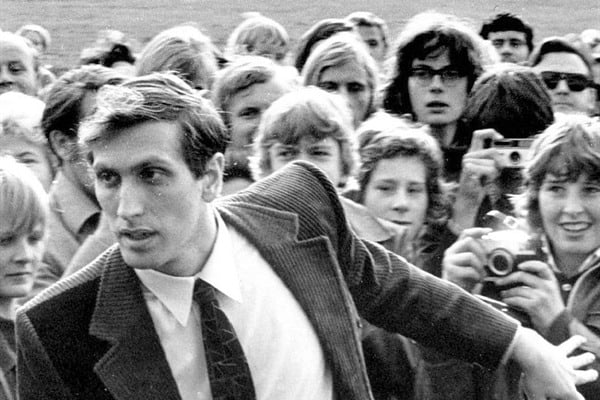
Remembering Bobby Fischer
10.03.2024 18:39 | HistoryReflecting on the legacy of Bobby Fischer, one of the most brilliant and controversial figures in chess history, on the anniversary of what would have been his 81st birthday.
This article explores Fischer's monumental successes and the missteps that made his life a subject of endless fascination and debate.
As we commemorate the birth of Bobby Fischer, who would have turned 81 yesterday, it's imperative to acknowledge both the unparalleled achievements that made him a chess legend and the controversies that clouded his personal life. Fischer's story is one of a meteoric rise to the apex of chess glory and a subsequent fall into enigmatic solitude, making him a figure of perpetual intrigue.
.jpg)
Unprecedented Successes
Bobby Fischer's chess career was marked by numerous groundbreaking achievements. His victory at the World Chess Championship in 1972 against Boris Spassky stands as his crowning achievement, breaking the Soviet dominance in the sport. This match, held in Reykjavik, Iceland, was not just a personal triumph for Fischer; it became a symbolic moment of Cold War tensions, representing a lone American's intellectual victory over the Soviet chess establishment. Fischer's path to the championship was studded with remarkable feats, including his historic 6-0 sweeps in the Candidates Matches against Mark Taimanov and Bent Larsen, and overcoming former World Champion Tigran Petrosian with a score of 6.5-2.5.
Fischer's contributions to chess theory and his development of the Fischer Random Chess variant also demonstrate his innovative approach to the game, challenging conventional strategies and offering fresh perspectives on chess openings.
Controversial Missteps
However, Fischer's life outside the chessboard was fraught with controversy. His abrupt disappearance from competitive chess after his 1972 victory, demands for unusual match conditions, and later, a series of inflammatory remarks severely affected his public image. Fischer's refusal to defend his title in 1975, leading to his default loss to Anatoly Karpov, was a pivotal moment that many fans and critics saw as a significant misstep, leaving the chess world wondering about the heights he could have reached had he continued competing.
Moreover, Fischer's later years were marked by legal troubles and a self-imposed exile, which were in stark contrast to his earlier chess triumphs. His criticisms of the United States and espousal of controversial views cast a long shadow over his legacy, complicating the narrative of his life as a chess savant.

A Complex Legacy
Bobby Fischer's legacy is a complex amalgam of unparalleled chess talent and contentious personal choices. His strategic innovations and his battles against the chess elite elevated the global status of chess, inspiring generations of players to pursue excellence with a new intensity. Yet, his life story also serves as a cautionary tale about the pitfalls of fame, the pressures of genius, and the fine line between brilliance and controversy.
Summary:
Bobby Fischer's 81st birthday invites reflection on a legacy that transcends the chess world. His remarkable journey from child prodigy to World Chess Champion embodies the pinnacle of intellectual conquest, while his later life reminds us of the human vulnerabilities that can accompany great genius. Fischer's achievements in chess are immortal, celebrated for their strategic depth and innovative brilliance. However, his life's more contentious chapters prompt ongoing debate about the balance between an individual's contributions and their personal failings. In remembering Bobby Fischer, we celebrate a legacy that continues to influence chess and intellectual pursuits far beyond the confines of the 64 squares.
